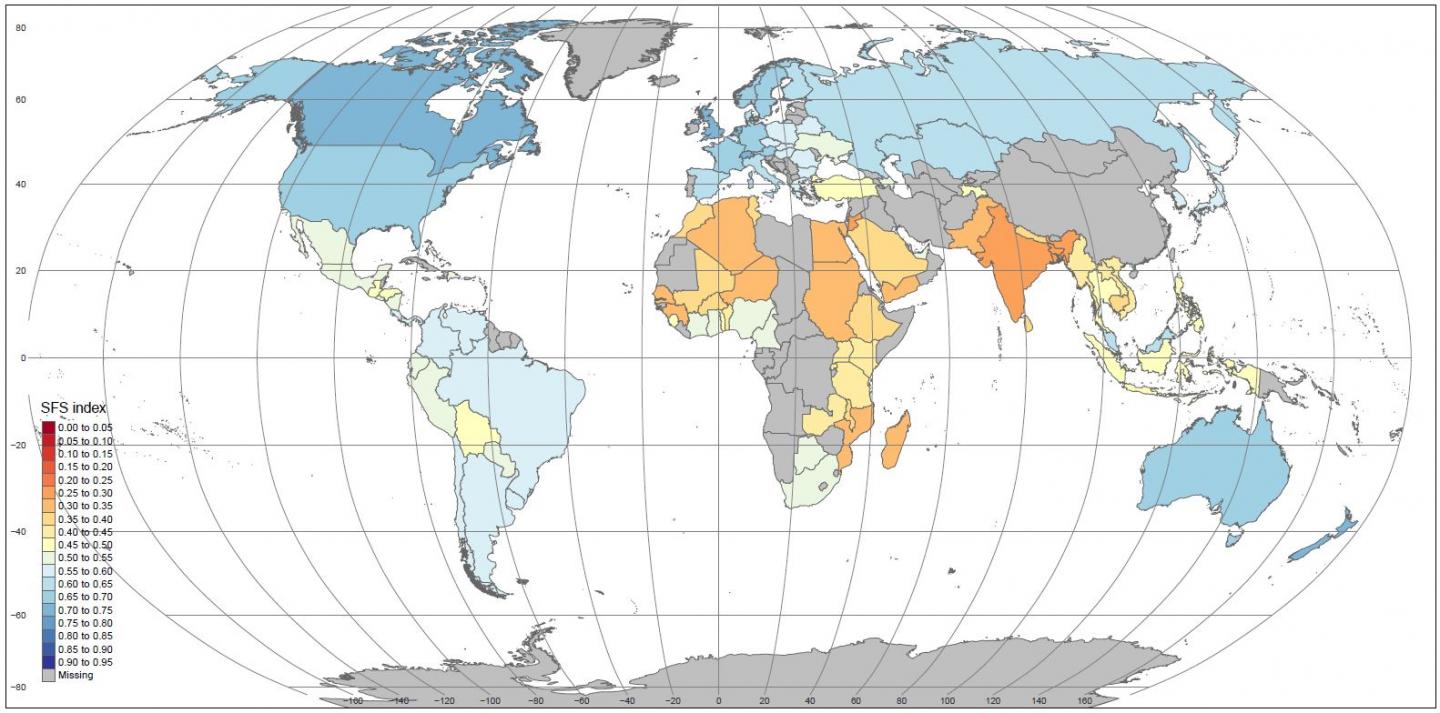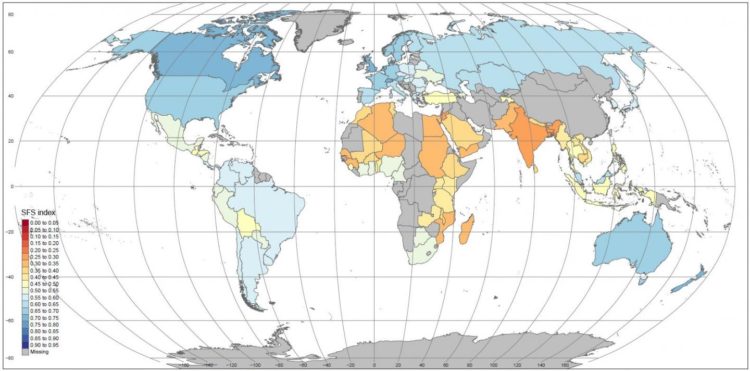A global food system sustainability study builds the first map of its kind to score the sustainability of food systems, country-by-country. The study goes beyond usual questions of productivity and nutrition, and includes economic and social variables

Credit: Béné et al., International Center for Tropical Agriculture
Increased awareness of how human diets acerbate climate change – while failing to properly nourish more than 800 million people – makes a better understanding of food systems a global priority. Global initiatives now call for us to transform our diets – for our health and the health of the planet – to help make food systems “sustainable.” But researchers at the International Center for Tropical Agriculture (CIAT) and colleagues argue that social and economic variables also need to be included if we are to understand exactly how sustainable our food systems are.
The researchers scoured almost two decades of scientific literature related to food systems. They settled on 20 indicators that are available to 97 countries from low-, middle- and high-income regions, and built a global map to rate the sustainability of food systems across the globe. The indicator can be used to track changes in sustainability over time and has the potential to guide policy and action as climate change, rising populations, and increased demand for food place unprecedented pressure on global food systems.
“Addressing the question of the (un)sustainability of our food systems is critical as the world is bracing for hard-choice challenges and potentially massive tradeoffs around issues related to food quality and food security in the coming decades,” wrote the authors in the journal Scientific Data, which is published by Nature. The research was published on November 25.
Food systems – which refer to the whole web of food production and consumption, from pre-production to food waste – are still a relatively new area of research. There is still little uniformity in terms of indicators used by researchers, governments and international development organizations. This research also aimed to seek standardized terms and methods to help further food systems research.
The study’s authors sorted the 20 indicators into four dimensions: environment, economic, social, and food and nutrition. The indicators cover a broad range of factors including greenhouse gas emissions from agriculture, size of the female labor force, fair trade, food price volatility, and food loss and waste.
“This is the first attempt to empirically measure and characterize the sustainability of the food systems worldwide considering not only the dimension food security and nutrition, or environment, but also economic, and social dimensions,” said Camila Bonilla, a co-author at the University of California, Davis.
The world’s largest employer
“The food system is probably the largest employer in the world, so the sustainability of food systems is also about the economic and social contributions of those hundreds of thousands of people and enterprises that are involved in some aspect of the system — from production all the way to food retail and distribution and consumption,” said Christophe Béné, the study’s lead author and senior policy expert at CIAT’s Decision and Policy Analysis (DAPA) research area. “It means that the economic and social dimensions of food system sustainability cannot be ignored.”
The map identifies some important knowledge gaps.
“Our research highlights how little is currently known about food systems,” said Béné. “The reason is that national statistical systems, in both high- and lower-income countries, are collecting only a small portion of the information that is needed to build a comprehensive picture of the whole system.”
In the 83 documents used in their literature review, the researchers found 192 different indicators, many of which have some level of overlap but not all of which were directly comparable across countries.
“This research represents a critical step forward in understanding the relationship between the structure and function of food systems and their sustainability,” said Steven Prager, a co-author senior scientist at CIAT who works on integrated modeling. “The global food system is really a set of interconnected subsystems and this work offers one of the most systematic attempts to date to unpack food system dynamics, from farm to fork to policy.”
###
Collaborators included scientists from SupAgro in France, the University of Denver and the University of California at Davis. The study is part of a broader research effort conducted by the same team on the dynamic of food systems at a global level, including some recent work on drivers of food systems.
This research was conducted as part of the CGIAR Research Program on Agriculture for Nutrition and Health’s Food Systems for Healthier Diets research flagship.
Media Contact
Sean Mattson
[email protected]
57-311-784-7652
Related Journal Article
http://dx.





